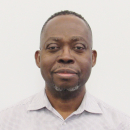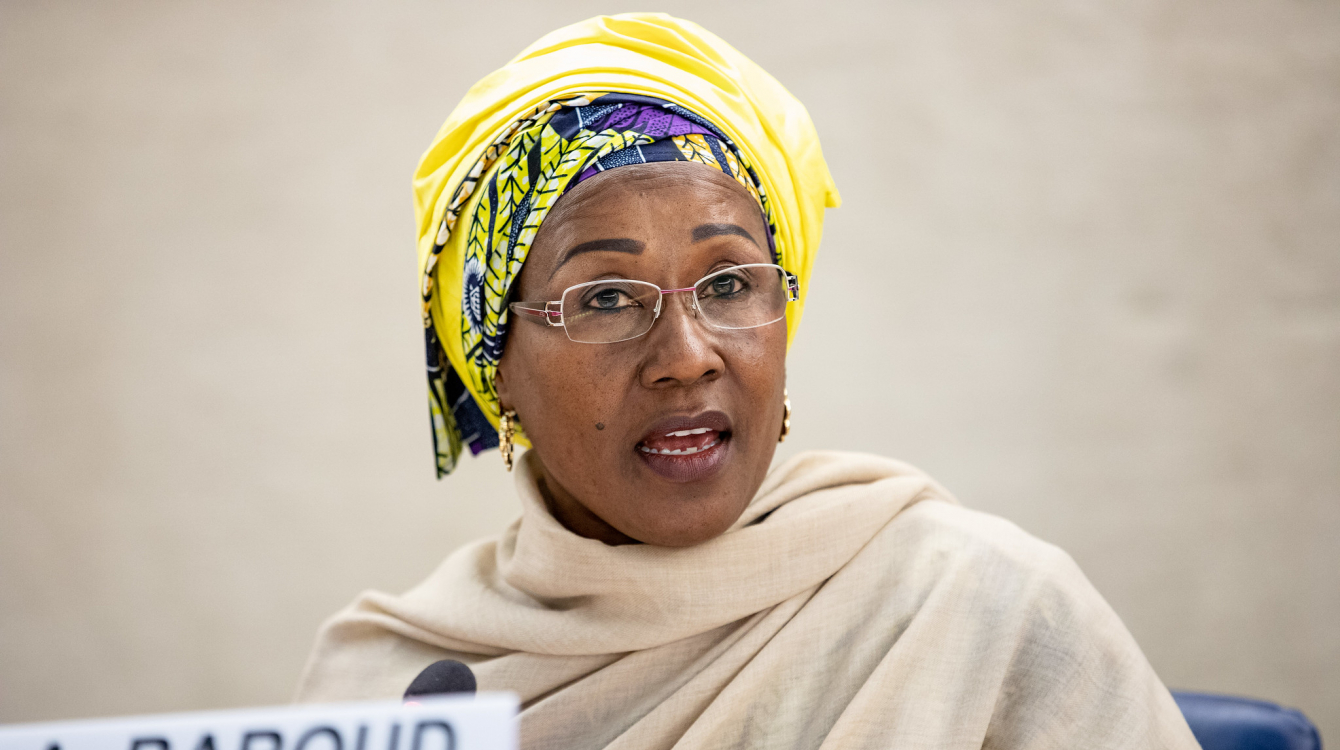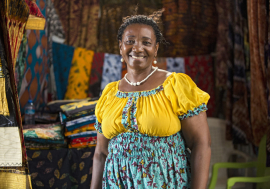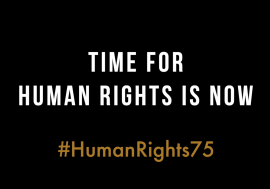Ambassador Ammo Aziza Baroud from Chad is one of only a handful of African female Permanent Representatives of their countries to the UN in New York. In Africa Renewal’s series profiling the African women representing their countries at UN Headquarters, she spoke with Franck Kuwonu about her priorities, the challenges so far and the crux of women’s empowerment. Here are excerpts:
Can you tell us a little bit about yourself?
Thank you very much for the opportunity. My name is Ammo Aziza Baroud from Chad, and I am a mother of four and a grandmother of four, with a fifth one on the way. It is important for me to mention this because where I come from, being a mother and a grandmother is valued. It also contributes to building social cohesion. In our societies, being a mother and a grandmother implies years of experience and empathy. Also, people associate it with being even-handed and committed.
Where were you working before this posting?
I was my country’s ambassador to the Benelux (Belgium, Netherlands and Luxemburg) states and to the European Union (EU) in Brussels, Belgium. It was a very demanding position because it was multilateral station, a place where interventions in Africa were important. I worked a lot. I was very involved in the renewal of the Cotonou Agreement between the African, Caribbean & Pacific’s (ACP) countries and the EU as President of the Committee of Ambassadors. It was quite a lot of work. [The Cotonou Agreement is a treaty between the EU and the African, Caribbean and Pacific Group of States (ACP countries) signed in June 2000 in Benin’s city of Cotonou. The treaty, which has been revised over the years, aims to reduce poverty through development cooperation, economic and trade cooperation and the political dimension of the Agreement, while contributing to sustainable development.]
Was the posting in Brussels your first diplomatic job? How about before that?
Yes, it was my first diplomatic post. Before diplomacy, I was involved in many different things.
First of all, I never wanted to be a civil servant because I wanted my independence. I thought if my career was not at the mercy of a bureaucrat, I could be effective wherever I wanted and as I wanted. The second thing was that, as a woman, I wanted to be financially independent.
So, up to university level, most of my education was abroad and once I returned home it was important that I make a place for myself. I was more of a freelancer before I started volunteering with NGOs because I needed to better familiarize myself with my country. Volunteering allowed me to observe, listen and understand things. Later, I worked for the UN Development Programme (UNDP) as a Programme Officer, dealing with emergencies, human rights, and rural development. That was huge.
Now that you are representing Chad at the UN, what would you consider to be the biggest challenge?
The most important challenge is to make sure that Africa, not just Chad, can weigh in on a number of issues and the Resolutions discussed at the UN. There are issues that are discussed directly at some level and then there are those that are kind of informal exchanges in small groups first, sometimes even among friends before they are introduced little by little at higher levels. My dream is to make sure that our voices, and those of people like me or who think like me, can be fully part of the process. That is my biggest challenge.
As you talk about wanting Africa to weigh in much more in big decisions, what would then be your three priorities for the year?
First would be the COVID-19 vaccination rollout and then reopening of schools.
The third one for me would be, as the UN Secretary-General continues with his reforms, that women be put at the centre. The debates around women’s issues should lead us to listen to women, instead of imposing solutions on them. This requires a lot of work, lobbying and building alliances.
It requires that there be more African female Permanent Representatives of their countries to the UN, not the current 4 or 5. This requires that at least 30 women represent the 54 African states, but that's a fight for another day. By the way can I make an appeal?
Certainly! Please go ahead and do so.
I would like to call on the Chairperson of the African Union Commission (AUC), Moussa Faki Mahamat, and the current Chairperson of the AU, Felix Tshisekedi, to in turn call upon African heads of state and government to send many more women permanent representatives here to New York because our countries are missing out on many things by not posting women to these jobs. I'm not questioning the value, the quality, the contribution of men, I'm just talking about what we're missing and what we're losing out because there are not many women in these posts.
Are these concerns shared by the rest of your female colleagues?
I talked about it with them, and they are aware.
And you are thinking of maybe having a group to advance this plan?
It is in on my mind. I've already started, and I will continue making the plea.
As mentioned, of African countries, only Angola, Chad, Eritrea, Rwanda and South Africa have women serving as their country’s Permanent Representatives. Madagascar also has a woman serving as the Chargée d’affaires a.i. How do you explain the fact that there are so few African women permanent representatives to the UN?
This was one of my biggest surprises when I arrived here. On the day I arrived in New York, I spoke with the Permanent Observer of the AU to the UN, Ambassador Fatima Kyari Mohammed.
So, I asked her, by the way, can you tell me how many Africans representatives there are, and if there is a group of African women representatives because I have ideas that I would like to share with them? I wanted to also introduce myself to them.
Ms. Mohammed said to me: for the moment there is you and me. Why? I wondered. She told me that two other women representatives were on leave, and that they would return to New York soon, and then the third one has just been appointed and she would be joining us soon. So, that means we are four women representatives at that time, and the fifth one is representing the AU. It was such a shock.
And since then, it has not changed much at all?
I arrived three months ago, and I don't know what will happen in the future.
If you have a message for young people and women in Africa today, what would that message be?
We talk about women's rights, women empowerment, violence against women, and also women in peacebuilding. All this, for me, means two things.
Women are at the centre of it all. An African woman, as soon as she has an income, she feeds her children, the neighbours, and the person passing by who doesn't have food. As soon as she can do that, her yard will start to fill up. As soon as her yard starts to fill up, her name will start to circulate, her voice will be heard and will start to be listened to. She can now influence and start to change and turn things around.
So, let's not lose sight of the fact that the most essential thing is independence, financial independence. When we say financial independence, we should not think only of a bank account. It could be a piece of land, with two or three helpers and a cow that allow her to be productive and give her independence. So, my message is to never lose sight of that.





















